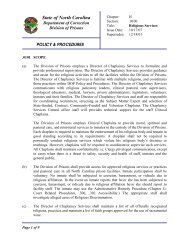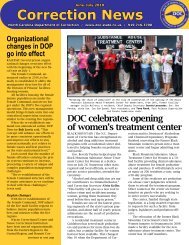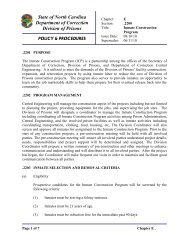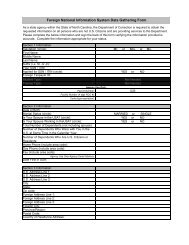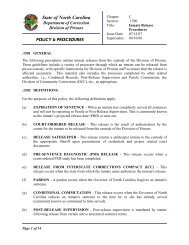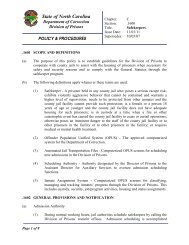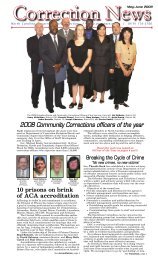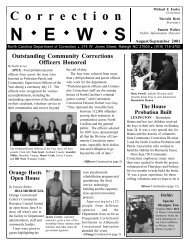Electronic Monitoring - North Carolina Department of Corrections
Electronic Monitoring - North Carolina Department of Corrections
Electronic Monitoring - North Carolina Department of Corrections
You also want an ePaper? Increase the reach of your titles
YUMPU automatically turns print PDFs into web optimized ePapers that Google loves.
INTRODUCTION<br />
Session Law 2006-247 (H1896) required the <strong>Department</strong> <strong>of</strong> Correction to establish a sex<br />
<strong>of</strong>fender monitoring program using a continuous satellite-based monitoring system to monitor<br />
sex <strong>of</strong>fenders in the community. Offenders subject to monitoring include those under<br />
probation, parole, or post-release supervision and certain <strong>of</strong>fenders who have completed their<br />
periods <strong>of</strong> supervision or incarceration but are subject to lifetime tracking pursuant to statute.<br />
Community <strong>Corrections</strong> began the use <strong>of</strong> global positioning systems (GPS) to aid in the<br />
supervision <strong>of</strong> sex <strong>of</strong>fenders in January 2007. Several challenges to the use <strong>of</strong> GPS<br />
technology, especially regarding those <strong>of</strong>fenders who had completed all incidents <strong>of</strong><br />
sentencing, resulted in a slower-than-anticipated start for the initiative. GPS continued to<br />
grow at a slow rate due to the presence <strong>of</strong> many court challenges. In October <strong>of</strong> 2010 the<br />
Supreme Court rendered a decision in State vs. Bowditch which stated that Satellite Based<br />
<strong>Monitoring</strong> (SBM) is not considered punishment, is a civil matter and therefore is retroactive<br />
to August 16, 2006. This will impact the numbers <strong>of</strong> cases in that the unsupervised lifetime<br />
population will continue to grow and determination hearings that were previously suspended<br />
awaiting Supreme Court decision will now resume. The Bowditch case along with others in<br />
the Court <strong>of</strong> Appeals has brought about further challenges and the need for more changes.<br />
(1) NUMBER OF SEX OFFENDERS ENROLLED<br />
N.C.G.S.14-208.40 establishes three categories <strong>of</strong> <strong>of</strong>fenders subject to GPS monitoring:<br />
(1) any <strong>of</strong>fender classified as a sexually violent predator, is a recidivist or was convicted<br />
<strong>of</strong> an aggravated <strong>of</strong>fense (Mandatory GPS); (2) any <strong>of</strong>fender who has committed an<br />
<strong>of</strong>fense involving the physical, mental, or sexual abuse <strong>of</strong> a minor and requires the highest<br />
possible level <strong>of</strong> supervision and monitoring based on a DOC risk assessment<br />
(Conditional GPS); and (3) any <strong>of</strong>fender who is convicted <strong>of</strong> G.S. 14-27.2A or G.S. 14-<br />
27.4A. All three categories require that the <strong>of</strong>fender be convicted <strong>of</strong> a reportable<br />
conviction and be required to register as a sex <strong>of</strong>fender.<br />
During FY 2010-2011, there were 136 new <strong>of</strong>fenders enrolled in the electronic monitoring<br />
program. Of the 136 <strong>of</strong>fenders, 68 were assigned to the conditional program (50%), while<br />
68 were assigned to the mandatory program (50%). All <strong>of</strong>fenders were monitored via<br />
active GPS. The table below represents the number <strong>of</strong> <strong>of</strong>fenders enrolled on GPS for FY<br />
2010-2011.<br />
2



